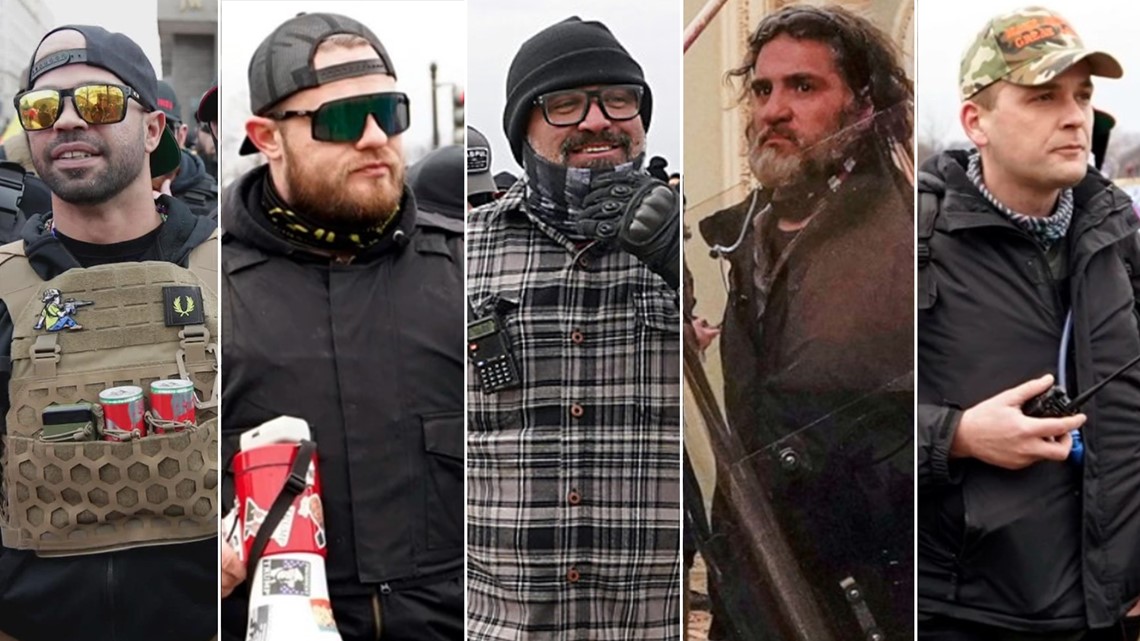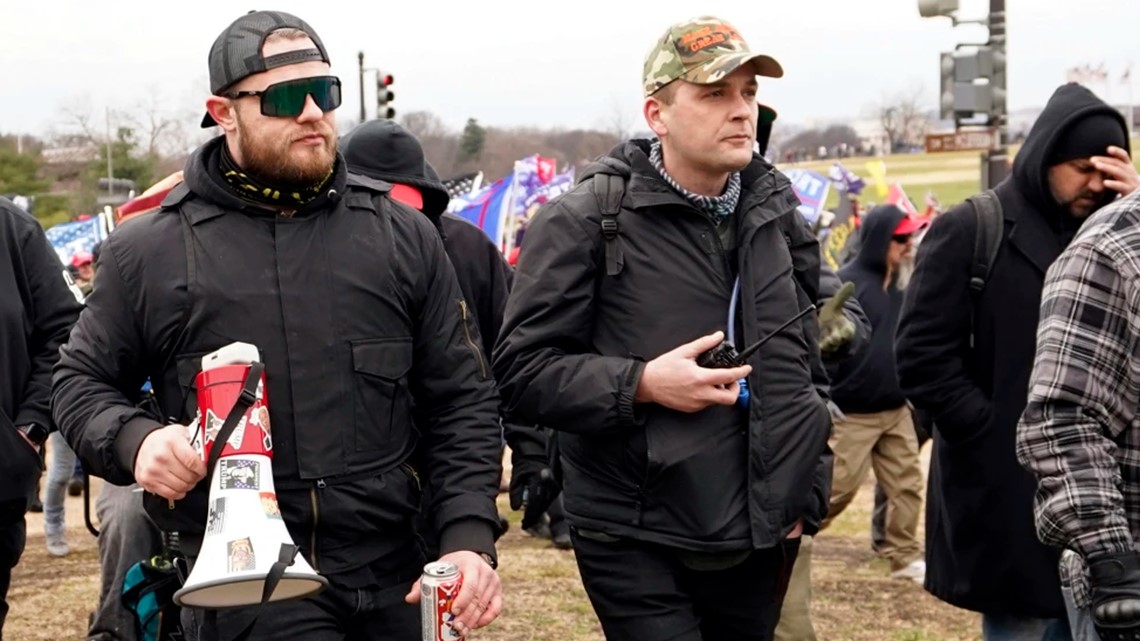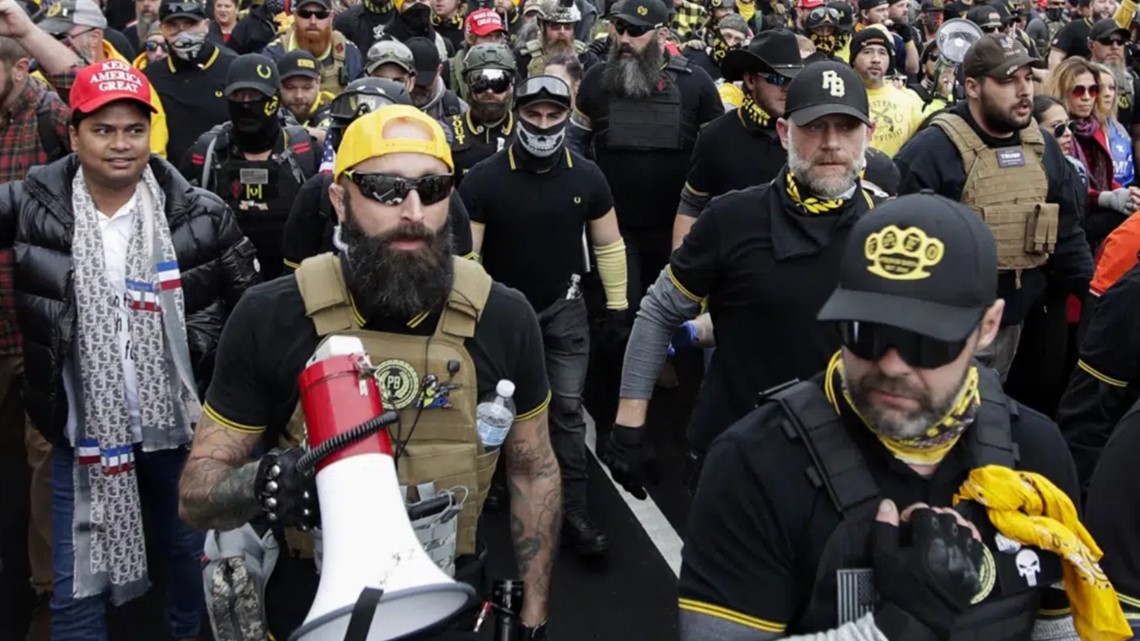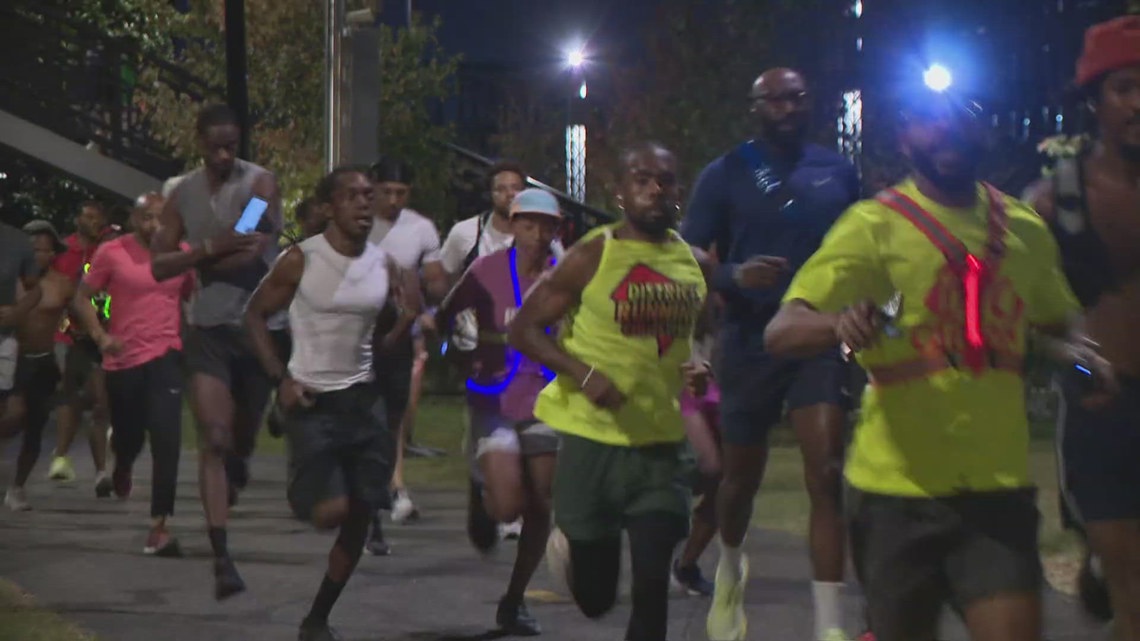A jury found the group's former chairman and three lieutenants conspired to oppose the government on Jan. 6, but did not reach a verdict for a fifth defendant.
WASHINGTON — A jury convicted four leaders of the far-right Proud Boys on Thursday of conspiring to incite violence at the U.S. Capitol — but failed to reach a verdict as to whether a New York man who used a shield to create the first breach of the building joined that conspiracy.
Jurors deliberated for five days before delivering their guilty verdict on the top two counts of seditious conspiracy and conspiracy to obstruct an official proceeding for Enrique Tarrio, Ethan Nordean, Joseph Biggs and Zachary Rehl. Tarrio, a one-time Republican congressional candidate and the Proud Boys’ former national chairman, showed little reaction as the verdict was read — keeping his head down and writing notes on a pad of paper.
The jury failed to reach a verdict on whether Dominic Pezzola, a New York resident and Marine Corps veteran, was a part of that conspiracy when he used a stolen police riot shield to smash in a window near the Senate Wing doors. They did convict Pezzola, along with his four co-defendants, of numerous other charges, including felony counts of obstruction of an official proceeding, conspiracy to prevent and officer from discharging their duties and obstruction of law enforcement during civil disorder. Pezzola was individually convicted of felony counts of robbery for stealing the police shield and destruction of government property over $1,000 — both felonies — for smashing in the window. Jurors did not return a verdict on whether his co-defendants shared responsibility for that destruction.


The result vindicated an enormous dedication of time and resources by the Justice Department to the lengthiest and most high-profile prosecution yet stemming from the Jan. 6, 2021, assault on the Capitol. Over more than four months, the prosecutors sought to prove the Proud Boys had organized themselves to become former President Donald Trump’s “fighting force” in the wake of his loss in the 2020 election. Although at the outset it was expected to take five-to-seven weeks, the trial faced repeated delays due to sickness, evidentiary arguments and, in one notable case, the late-breaking revelation that a witness Tarrio’s attorneys planned to call had for nearly two years been providing information to the FBI – although not about the Proud Boys.
Government cooperators and informants played an outsized role in the trial for both sides. Prosecutors called two former Proud Boys who’d taken plea deals, Jeremy Bertino and Matthew Greene, to testify about the group’s increasing hostility to police and preparation for a “civil war” in late 2020. The defense, however, repeatedly questioned FBI agents about the lack of any reporting by informants in the Proud Boys about a plan to attack the Capitol. One such informant who marched with the group on Jan. 6, who testified only under the name “Aaron,” denied any knowledge of a plan to commit violence that day.
The verdict could mean lengthy prison sentences for for the defendants, many of whom have been held in pre-trial detention since early 2021. For veterans Rehl and Biggs — and Pezzola, if the jury ultimately returns a guilty verdict on seditious conspiracy — it could also mean the loss of military benefits from their service.
A sentencing date was not yet set Thursday as jurors were expected to continue deliberating on the outstanding counts.
Tools of the Conspiracy
When prosecutors asked a jury to convict members of the Oath Keepers militia last year, they had a powerful piece of evidence: a pile of weapons stored in a Ballston hotel just outside of D.C. The Oath Keepers referred to it as their “QRF,” or quick reaction force. Prosecutors argued it was proof the militia members had conspired to forcibly oppose the government – a key element of the rarely used seditious conspiracy charge.
The Justice Department had no such arsenal to point to in the Proud Boys trial, however. Instead, prosecutors developed a novel “tools” theory to explain how the group’s leaders planned to use lower-ranking members and others in the crowd, who they referred to as “normies,” as their weapons to overwhelm police and, ultimately, stop the certification of the 2020 election.
“They hoped the ‘normies’ – that is, the civilians – would burn the city to ash,” Assistant U.S. Attorney Jason McCullough told jurors during the government’s opening statements in January.


To do that, prosecutors relied on hundreds of Telegram and Parler messages showing the Proud Boys’ increasingly belligerent rhetoric in late 2020 after the group had received what it interpreted as a shoutout by Trump during a debate with President Joe Biden. Multiple Proud Boys testified the group was ecstatic after Trump told them to “stand back and stand by” and that applications for membership grew exponentially. When defendant Zachary Rehl, the former president of the Proud Boys’ Philadelphia chapter, took the stand, prosecutors suggested he took advantage of that surge of interest to fast track potential members who were “prepared to commit violence.”
“We got a new beast joining. He’s getting fast tracked,” Rehl said in a message shown to jurors. “He’s like 6’5” and ready to crack skulls.”
The Proud Boys were further inflamed, prosecutors said, by what they perceived as an insufficient law enforcement response to the stabbing of four members after a pro-Trump rally in D.C. on Dec. 12, 2020. Jeremy Bertino, a North Carolina Proud Boy who pleaded guilty last year to seditious conspiracy and firearms charges, said after the stabbing – during which he was seriously injured – the group began referring to police as “coptifa.”
“I felt like they were not on our side anymore,” Bertino said. “And basically if you were not with us, you were against us.”


What the Proud Boys did next developed into a main point of contention in the trial. Defense attorneys said Tarrio and other leaders, including Rehl, Nordean and Biggs, formed a new chapter called the “Ministry of Self-Defense” to get a handle on recruiting efforts and to prevent more violence in the future. Prosecutors said the chapter wasn’t formed until after Trump’s call for supporters to join him in D.C. on Jan. 6 which, he promised, would be “wild.”
“The Ministry of Self-Defense was a violent gang that came together to use force against its enemies,” Assistant U.S. Attorney Conor Mulroe said during the government’s closing arguments. “It was all about force. It wasn’t to prevent violence. It was to channel it. Or, in Enrique Tarrio’s words, to ‘harness these rally boys in real numbers.’”
Rally Boys Meet Herd Mentality
On Jan. 6, 2021, the Proud Boys’ so-called “rally boys” did arrive in real numbers in D.C. As many as 100 members of the group gathered at the Washington Monument and then marched with other Trump supporters to the Capitol, where they posed for a picture. Proud Boys, including some of the defendants, were on the front lines at the first two breaches of bike rack barricades. A Proud Boy, “Hurricane Coast” chapter member Daniel “Milkshake” Scott, pleaded guilty to an assault on police that helped spark the surge up the West Terrace stairs. Dominic Pezzola, then a newly minted second-degree Proud Boy, used a police riot shield to create the first breach of the building. Proud Boy Joshua Pruitt, who had been inducted into the group by Enrique Tarrio himself two months earlier, then pushed into the building and was one of only a handful of rioters to come face-to-face with a member of Congress – in Pruitt’s case, Senate Minority Leader Chuck Schumer, whose security detail immediately rerouted the senator’s evacuation after seeing Pruitt in the Capitol Visitor’s Center.
But all of that, the defense argued, was not evidence of a conspiracy. It was instead as “Aaron” – the informant who’d marched with the group – texted his handler on Jan. 6: a spontaneous event.
“The crowd did it as herd mentality,” he wrote. “Not organized.”
Over more than four months, no Proud Boy took the stand and said he was aware of a specific, explicit plan to attack the Capitol or disrupt the joint session of Congress. Even Bertino, who pleaded guilty to seditious conspiracy, said he believed the group had an “implicit” understanding that their role was as the “tip of the spear” for the pollical right. In their plea deals, neither Pruitt, who is now serving more than four years in prison, nor Scott, who faces 41-63 months in prison at his sentencing hearing next month, mentioned any knowledge of a plan. Scott, who helped initiate the surge against the police lines, specifically said he “had not been told the details of any plans” made by Proud Boys leaders.
“This is not even close on conspiracy,” attorney Nick Smith, representing Nordean, told the jury. “It’s not even close. The government’s case is held together with paper clips and rubber bands.”
Nordean, a former bodybuilder who gained fame among the Proud Boys for punching a counter-protestor in Portland in 2018, took the reins of the group on Jan. 6 alongside Biggs following Tarrio’s arrest in D.C. two days earlier. Nordean and Biggs, a U.S. Army veteran and Purple Heart recipient, helped lead the Proud Boys from the Washington Monument to the Capitol and can be seen at one point helping to dismantle fencing near the West Terrace. Both men entered the building, as did Rehl and Pezzola.
During trial, Smith downplayed Nordean’s leadership abilities – repeatedly quoting another Proud Boy who said the group was “so disorganized they couldn’t even order McDonald’s.” He also pointed to a video of Nordean pulling another man off a police officer.
“Why would someone planning to interfere with law enforcement stop an assault?” Smith asked. “It doesn’t make any sense.”
The riot, Smith said, was just that: a riot.
“It’s not a deep-laid conspiracy,” he told jurors.
Throughout the trial, defense attorneys repeatedly accused the government of misrepresenting evidence and calling witnesses they knew were being untruthful – particularly Bertino, who Tarrio’s attorney Nayib Hassan took to calling “Lying Bertino.” Rehl’s attorney, Carmen Hernandez, accused prosecutors of withholding evidence when they produced a video purporting to show him pepper spraying police only after his cross-examination began. Several of the attorneys suggested it was the former president, not their clients, who should be sitting in front of the jury.
“It was Donald Trump’s words, it was his motivation, it was his anger that caused what happened on Jan. 6 in your amazing, beautiful city,” Hassan said. “It was not Enrique Tarrio. They want to use Enrique Tarrio as a scapegoat for Donald Trump and those in power. They want to use you.”
We're tracking all of the arrests, charges and investigations into the January 6 assault on the Capitol. Sign up for our Capitol Breach Newsletter here so that you never miss an update.
.png)









 English (US) ·
English (US) ·